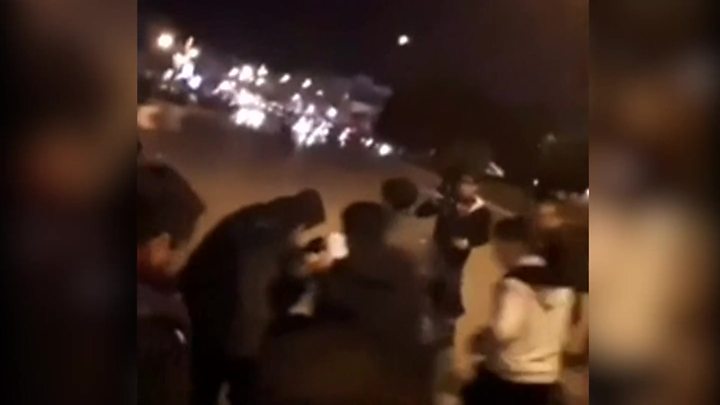Iran unrest: State TV reports 10 dead as protests go on
Ten people have been killed in anti-government protests sweeping Iran, according to state TV.
It did not specify where or when they happened. Six deaths were previously reported, including two people shot dead overnight in the town of Izeh.
The protests continued despite a call for calm from President Hassan Rouhani on Sunday.
In his first intervention, President Rouhani warned that violence would not be tolerated at the protests.
Mr Rouhani acknowledged grievances over Iran's economic situation, a lack of transparency and corruption, but defended his record.
The Iranian president said that citizens were "completely free to express their criticism of the government or stage protests… in a way that would lead to the improvement of the country's conditions" but warned against violent acts.
Nevertheless, protests continued. Police used tear gas and water cannon to quell a rally in Tehran's Engheleb Square, reported AFP news agency, and demonstrations were reported in Kermanshah and Khorramabad in the west, Shahinshahr in the north west and the northern city of Zanjan.
The demonstrations, which erupted on Thursday in Iran's second city of Mashhad, are the biggest show of dissent seen since the huge rallies of the Green Movement were brutally suppressed in 2009.
- US warns Iran: The world is watching
- Iran's Revolutionary Guards take lead on foreign affairs
- Who is Hassan Rouhani?
Until state TV reported 10 dead, six people were reported to have died:
- Two deaths in in the western city of Dorud on Saturday, blamed by authorities on Sunni Muslim extremists and foreign powers
- A further two people killed in Dorud when what were described as rioters seized a fire engine and then crashed into two other vehicles
- Two people shot dead in the south-western town of Izeh overnight, according to a local lawmaker
How have authorities responded to protests?
In his remarks Mr Rouhani acknowledged popular grievances, though he warned that the government would show "no tolerance for those who damage public properties, violate public order and create unrest in the society".
And Iran's Revolutionary Guards Corps (IRGC) has warned anti-government protesters they will face the nation's "iron fist" if political unrest continues.
The IRGC is a powerful force with ties to the country's supreme leader, and is dedicated to preserving the country's Islamic system. Correspondents say it would be a significant escalation were they to become officially involved in policing the protests.
Up to 400 people are reported to have been arrested in recent days, including 200 in Tehran on Saturday night.
And authorities continue to sporadically suspend social media websites they fear will be used to organise protests, including Telegram and Instagram.
State media have now begun broadcasting some footage on the protests, though it focused on young men attacking banks and vehicles or burning the Iranian flag, reported AFP news agency.
On Sunday police used water cannon to disperse protesters at a major intersection, as captured in a video obtained by BBC Persian.
Skip Twitter post by @bbcpersian
پلیس با کمک ماشین آبپاش در حال متفرق کردن تجمع کنندگان در خیابان چهارولیعصر، انقلاب در تهران در شامگاه یکشنبه دهم دی ماه؛ ویدئو ارسالی بوسیله مخاطبان بیبیسی فارسی pic.twitter.com/9kieMiuni6
— BBC Persian (@bbcpersian) December 31, 2017
Report
End of Twitter post by @bbcpersian
What about Mr Rouhani's war of words with Donald Trump?
Mr Rouhani described the US president as an "enemy of the Iranian nation from the top of his head to his very toes" after Mr Trump said Iranians were "finally getting wise as to how their money and wealth is being stolen and squandered on terrorism".
And late on 31 December, Mr Trump tweeted more criticism of events in Iran.
Skip Twitter post by @realDonaldTrump
Iran, the Number One State of Sponsored Terror with numerous violations of Human Rights occurring on an hourly basis, has now closed down the Internet so that peaceful demonstrators cannot communicate. Not good!
— Donald J. Trump (@realDonaldTrump) December 31, 2017
Report
End of Twitter post by @realDonaldTrump
Where will the protests lead?
Analysis by Kasra Naji, BBC Persian
There is widespread and seething discontent in Iran where repression is pervasive and economic hardship is getting worse – one BBC Persian investigation has found that on average Iranians have become 15% poorer in the past 10 years.
Protests have remained confined to relatively small pockets of mostly young male demonstrators who are demanding the overthrow of the clerical regime.
They have spread to small towns throughout the country and have the potential to grow in size.
But there is no obvious leadership. Opposition figures have long been silenced or sent into exile.
Some protesters have been calling for the return of the monarchy and the former shah's son, Reza Pahlavi, who lives in exile in the United States, has issued a statement supporting the demonstrations. But there are signs that he is as much in the dark about where these protests are going as anyone else.
BBC Persian, which broadcasts on TV, on radio and online from London, is banned in Iran – where staff and their families routinely face harassment and questioning from the authorities.
What happened in 2009?
Mass demonstrations – referred to as the Green Movement – were held by millions of opposition supporters against the disputed election victory of incumbent president Mahmoud Ahmadinejad.
At least 30 people were killed and thousands arrested in the wave of protests, which drew the largest crowds in Iran since the Islamic Revolution in 1979.

